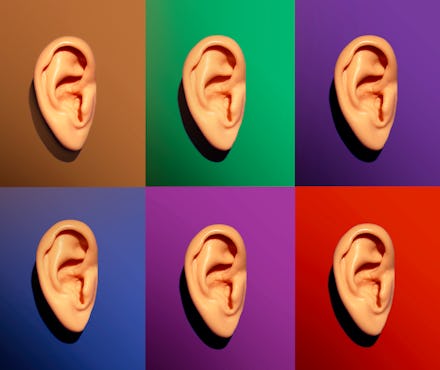Yet another awful symptom for COVID-19 long-haulers has been discovered

Throughout the pandemic, we’ve all felt confused about what, exactly, the symptoms of COVID-19 are. That’s because not only is it a new virus, but it also affects some people differently. People who’ve been infected with it have been reporting that they’re experiencing a debilitating ringing in the ears called tinnitus — often even months after they’ve recovered. Here’s what we know about this often overlooked COVID-19 symptom.
A preliminary study from the U.K. was released in March that suggested that folks who were infected with COVID-19 experienced several ear-related symptoms. According to the study, 15% of people who had COVID-19 experienced tinnitus, 7.6% had hearing loss, and 7.2% reported vertigo — a loss of balance and sense of dizziness frequently caused by damage to the inner ear. When the study came out, the researchers got thank you notes from COVID-19 patients who said their doctors had brushed their symptoms aside.
That study was conducted in the U.K., but it also validated what a lot of COVID-19 survivors globally were going through. “In the 24 hours since we published, I’ve received about 100 emails,” said Kevin Munro, a professor of audiology at the University of Manchester and a co-author of the study, told the New York Times in March. “My doctor thought I was crazy when I mentioned tinnitus and now I know I’m not the only one.’”
Physicians (and everyone else) are more likely to take these ear-related symptoms seriously now. Part of that is because the study, albeit small and regional, gave conclusive evidence that these symptoms are real, and part of it is, unfortunately, because Kent Taylor, the CEO of restaurant chain Texas Roadhouse, took his life in March when he found dealing with the symptoms of tinnitus unbearable, reported the Times. So while it may seem like ringing in the ears is sort of a vague or unserious symptom, people who experience tinnitus really suffer and they deserve treatment.
A charity in the U.K., British Tinnitus Association, reported a 256% increase in tinnitus-related calls in the last half of 2020, and calls to its helpline rose by 16% during the same period, reported The Guardian. Some experts have suspected a link between COVID-19 and ear issues for a while. Preliminary studies were released back in June that suggest a link between COVID-19 and tinnitus.
Why are we only hearing about this now? Well, part of the problem is that tinnitus is difficult to diagnose. It’s self-reported, meaning there’s no medical way to test for it. Tinnitus is also generally not life threatening, unlike some of the most severe symptoms of COVID-19. Luckily, it seems like the vaccines will help with some long hauler symptoms like tinnitus, though, which is just more evidence that we should all get the vaccine.
There is also progress in getting tinnitus recognized as a symptom — just not in the U.S. The U.K.'s National Health Service lists tinnitus as a COVID-19 side effect, but the C.D.C. does not. Honestly, not only is that a public health disservice, it’s also embarrassing. The fact that some U.S. leaders have seemingly refused to acknowledge facts and science throughout the pandemic just makes us look like dizzy barbarians, which, in fact, we may be.